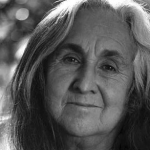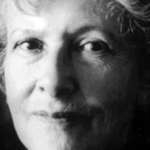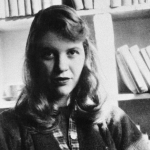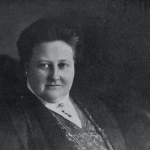To a Husband
T
Similar Poems:
To the Young Wife by Charlotte Anna Perkins Gilman

Are you content, you pretty three-years’ wife?
Are you content and satisfied to live
On what your loving husband loves to give,
And give to him your life?
Are you content with work, — to toil alone,
To clean things dirty and to soil things clean;
To be a kitchen-maid, be called a queen, —
Read Poem Are you content and satisfied to live
On what your loving husband loves to give,
And give to him your life?
Are you content with work, — to toil alone,
To clean things dirty and to soil things clean;
To be a kitchen-maid, be called a queen, —
0
from The Book of the Dead: Absalom by Muriel Rukeyser

I first discovered what was killing these men.
I had three sons who worked with their father in the tunnel:
Cecil, aged 23, Owen, aged 21, Shirley, aged 17.
They used to work in a coal mine, not steady work
for the mines were not going much of the time.
A power Co. foreman learned that we made home brew,
he formed a habit of dropping in evenings to drink,
persuading the boys and my husband —
Read Poem I had three sons who worked with their father in the tunnel:
Cecil, aged 23, Owen, aged 21, Shirley, aged 17.
They used to work in a coal mine, not steady work
for the mines were not going much of the time.
A power Co. foreman learned that we made home brew,
he formed a habit of dropping in evenings to drink,
persuading the boys and my husband —
0
Paradise Lost: Book 8 (1674 version) by John Milton

THE Angel ended, and in Adams Eare
So Charming left his voice, that he a while
Thought him still speaking, still stood fixt to hear;
Then as new wak't thus gratefully repli'd.
What thanks sufficient, or what recompence
Equal have I to render thee, Divine
Hystorian, who thus largely hast allayd
The thirst I had of knowledge, and voutsaf't
This friendly condescention to relate
Things else by me unsearchable, now heard
With wonder, but delight, and, as is due,
With glorie attributed to the high
Creator; something yet of doubt remaines,
Which onely thy solution can resolve.
When I behold this goodly Frame, this World
Read Poem So Charming left his voice, that he a while
Thought him still speaking, still stood fixt to hear;
Then as new wak't thus gratefully repli'd.
What thanks sufficient, or what recompence
Equal have I to render thee, Divine
Hystorian, who thus largely hast allayd
The thirst I had of knowledge, and voutsaf't
This friendly condescention to relate
Things else by me unsearchable, now heard
With wonder, but delight, and, as is due,
With glorie attributed to the high
Creator; something yet of doubt remaines,
Which onely thy solution can resolve.
When I behold this goodly Frame, this World
0
Paradise Lost: Book 10 (1674 version) by John Milton

MEanwhile the hainous and despightfull act
Of Satan done in Paradise, and how
Hee in the Serpent, had perverted Eve,
Her Husband shee, to taste the fatall fruit,
Was known in Heav'n; for what can scape the Eye
Of God All-seeing, or deceave his Heart
Omniscient, who in all things wise and just,
Hinder'd not Satan to attempt the minde
Read Poem Of Satan done in Paradise, and how
Hee in the Serpent, had perverted Eve,
Her Husband shee, to taste the fatall fruit,
Was known in Heav'n; for what can scape the Eye
Of God All-seeing, or deceave his Heart
Omniscient, who in all things wise and just,
Hinder'd not Satan to attempt the minde
0
Beach Body by Ovid

early morning. down to the shore again
to find a place to grieve. the place he left
lingering. here the ropes were loosed [here
he gave me kisses on the shore, here he left] she said
and while she thought and looked and felt, looking out
along the shore, in liquid space, she saw—far off
not sure—a body or something in the water—
wondered what, but then the waves pulled it by—still
Read Poem to find a place to grieve. the place he left
lingering. here the ropes were loosed [here
he gave me kisses on the shore, here he left] she said
and while she thought and looked and felt, looking out
along the shore, in liquid space, she saw—far off
not sure—a body or something in the water—
wondered what, but then the waves pulled it by—still
0
Imitations of Horace by Alexander Pope

Ne Rubeam, Pingui donatus Munere
(Horace, Epistles II.i.267)
While you, great patron of mankind, sustain
The balanc'd world, and open all the main;
Your country, chief, in arms abroad defend,
At home, with morals, arts, and laws amend;
Read Poem (Horace, Epistles II.i.267)
While you, great patron of mankind, sustain
The balanc'd world, and open all the main;
Your country, chief, in arms abroad defend,
At home, with morals, arts, and laws amend;
0
O Ye Tongues by Anne Sexton

First Psalm
Let there be a God as large as a sunlamp to laugh his heat at you.
Let there be an earth with a form like a jigsaw and let it fit for all of ye.
Let there be the darkness of a darkroom out of the deep. A worm room.
Let there be a God who sees light at the end of a long thin pipe and lets it in.
Let God divide them in half.
Let God share his Hoodsie.
Let the waters divide so that God may wash his face in first light.
Read Poem Let there be a God as large as a sunlamp to laugh his heat at you.
Let there be an earth with a form like a jigsaw and let it fit for all of ye.
Let there be the darkness of a darkroom out of the deep. A worm room.
Let there be a God who sees light at the end of a long thin pipe and lets it in.
Let God divide them in half.
Let God share his Hoodsie.
Let the waters divide so that God may wash his face in first light.
0
Paradise Lost: Book 9 (1674 version) by John Milton

NO more of talk where God or Angel Guest
With Man, as with his Friend, familiar us'd
To sit indulgent, and with him partake
Rural repast, permitting him the while
Venial discourse unblam'd: I now must change
Those Notes to Tragic; foul distrust, and breach
Disloyal on the part of Man, revolt,
And disobedience: On the part of Heav'n
Read Poem With Man, as with his Friend, familiar us'd
To sit indulgent, and with him partake
Rural repast, permitting him the while
Venial discourse unblam'd: I now must change
Those Notes to Tragic; foul distrust, and breach
Disloyal on the part of Man, revolt,
And disobedience: On the part of Heav'n
0
Käthe Kollwitz by Muriel Rukeyser

1
Held between wars
my lifetime
among wars, the big hands of the world of death
my lifetime
listens to yours.
The faces of the sufferers
in the street, in dailiness,
Read Poem Held between wars
my lifetime
among wars, the big hands of the world of death
my lifetime
listens to yours.
The faces of the sufferers
in the street, in dailiness,
0
from Gilgamesh: Tablet 11 by David Ferry

i
Gilgamesh spoke and said to the old man then:
"When I looked at you I thought that you were not
a man, one made like me; I had resolved
to challenge you as one might challenge a demon,
a stranger-adversary. But now I see
that you are Utnapishtim, made like me,
a man, the one I sought, the one from whom
Read Poem Gilgamesh spoke and said to the old man then:
"When I looked at you I thought that you were not
a man, one made like me; I had resolved
to challenge you as one might challenge a demon,
a stranger-adversary. But now I see
that you are Utnapishtim, made like me,
a man, the one I sought, the one from whom
0
An Immigrant Woman by Anne Winters

PART ONE
I
Slip-pilings on the Brooklyn littoral
—the poles still tarry, flimsy; the ferry terminus
with its walledup doors wan doorshapes
on eroded sills. Downstream, the strutwork
of the Williamsburg cable tower
threw its cool shadow half a mile inland
Read Poem I
Slip-pilings on the Brooklyn littoral
—the poles still tarry, flimsy; the ferry terminus
with its walledup doors wan doorshapes
on eroded sills. Downstream, the strutwork
of the Williamsburg cable tower
threw its cool shadow half a mile inland
0
The Waste Land by T. S. Eliot

‘Nam Sibyllam quidem Cumis ego ipse oculis meis vidi in ampulla pendere, et cum illi pueri dicerent:Σίβυλλα τίθέλεις; respondebat illa:άποθανεîνθέλω.’ For Ezra Pound
il miglior fabbro. I. The Burial of the Dead
Read Poem il miglior fabbro. I. The Burial of the Dead
0
The Prediction by Mark Strand

That night the moon drifted over the pond,
turning the water to milk, and under
the boughs of the trees, the blue trees,
a young woman walked, and for an instant
the future came to her:
rain falling on her husband’s grave, rain falling
on the lawns of her children, her own mouth
filling with cold air, strangers moving into her house,
Read Poem turning the water to milk, and under
the boughs of the trees, the blue trees,
a young woman walked, and for an instant
the future came to her:
rain falling on her husband’s grave, rain falling
on the lawns of her children, her own mouth
filling with cold air, strangers moving into her house,
0
Something in the Belly by Deena Metzger

I wanted to have a poem and I was pregnant. I was very thin. As if I’d lived on air. A poet must be able to live on air, but a mother must not attempt it. My mother wanted me to buy a set of matching pots, Wearever aluminum, like the ones she had. They were heavy and had well fitting lids so my suppers wouldn’t burn. My husband wanted me to give dinner parties. John F. Kennedy was running for office.
I sensed danger. Kennedy wasn’t against the Bomb or for nuclear disarmament. I joined SANE at its inception. Also Concerned Scientists. I spoke with Linus Pauling and encouraged my husband to help his partner organize Physicians for Social Responsibility.
There was a baby in my belly. I wanted to write poems. I had a crazy idea that a woman could write a real novel, the kind that shook the world. I hallucinated that a woman could be a poet, but she would have to be free. I couldn’t imagine that freedom for myself even though I could see it in Isla Negra when I followed Pablo Neruda. I could see it in the way he walked. Even if he were walking inside a dictatorship, among guns, soldiers and spies, there was nothing between him and his vision. Anything he saw, he was able to take into himself–there was no sight, no image, no vision to which he didn’t feel entitled. In his heart, everything–everything–belonged to him. Pablo Neruda was–more than anything–a poet, and so he was an entitled man.
I was a woman and entitled to nothing. I had nothing except a husband, a rented house, a set of pots, living room furniture, a frenzy of obligations, credit cards, anxious relatives, too many acquaintances, a gift of future diaper service, two telephones, no time to read, a plastic wrapped cookbook of recipes gleaned from the pages of the New York Times, and a hunger, a terrible hunger for the unimaginable, unlimited freedom of being a poet, and a baby in my belly.
I would have called Pablo long distance if I had the courage, if I had the ability to speak Spanish fluently, if we had ever talked about real things. But, what would a man know about a baby in the belly? And what did it matter if there were to be one poet more or less in the world when so many in his country were dying?
I woke up one morning and thought–I can’t have this child. My husband said, “You’ll have to get a job after it’s born so we can buy a house. You’ll need an advanced degree so you can do something.” I thought, I can’t. I have to write poems. My mother found a crib. Someone painted it white. A friend sent a pastel mobile with tame wood animals. I thought about blue curtains, making bedspreads, and abortions.
Pablo was silent. He was walking so far from me, I couldn’t hear him. My husband objected to donating more free medical care to the Black Panthers. I tried to make dolmades from scratch and located grape leaves preserved in brine at the Boys’ Market twenty miles away. I organized a write-in campaign for peace to challenge JFK. My husband thought it would be nice to have teatime with the children and romantic dinners by ourselves. The new formula bottles lined up on the sink like tiny bombs. The U.S. was pursuing over ground testing; I was afraid the radiation would cross the milk barrier. I had a poem in me howling for real life but no language to write in. The fog came in thick, flapping about my feet like blankets unraveling. I became afraid to have a daughter.
I called Pablo Neruda in the middle of the night as he walked underwater by Isla Negra. He moved like a dream porpoise. He seemed pregnant with words. They came out of his penis in long miraculous strings. The sea creatures quivered with joy. I said, “Pablo, I want to know how to bear the child in my belly onto this bed of uranium and I want to know if a woman can a be a poet.” He was large as a whale. He drank the sea and spouted it in glistening odes, black and shiny. I said, “I can’t have this child,” and he laughed as if he had never done anything but carry and birth children.
Read Poem I sensed danger. Kennedy wasn’t against the Bomb or for nuclear disarmament. I joined SANE at its inception. Also Concerned Scientists. I spoke with Linus Pauling and encouraged my husband to help his partner organize Physicians for Social Responsibility.
There was a baby in my belly. I wanted to write poems. I had a crazy idea that a woman could write a real novel, the kind that shook the world. I hallucinated that a woman could be a poet, but she would have to be free. I couldn’t imagine that freedom for myself even though I could see it in Isla Negra when I followed Pablo Neruda. I could see it in the way he walked. Even if he were walking inside a dictatorship, among guns, soldiers and spies, there was nothing between him and his vision. Anything he saw, he was able to take into himself–there was no sight, no image, no vision to which he didn’t feel entitled. In his heart, everything–everything–belonged to him. Pablo Neruda was–more than anything–a poet, and so he was an entitled man.
I was a woman and entitled to nothing. I had nothing except a husband, a rented house, a set of pots, living room furniture, a frenzy of obligations, credit cards, anxious relatives, too many acquaintances, a gift of future diaper service, two telephones, no time to read, a plastic wrapped cookbook of recipes gleaned from the pages of the New York Times, and a hunger, a terrible hunger for the unimaginable, unlimited freedom of being a poet, and a baby in my belly.
I would have called Pablo long distance if I had the courage, if I had the ability to speak Spanish fluently, if we had ever talked about real things. But, what would a man know about a baby in the belly? And what did it matter if there were to be one poet more or less in the world when so many in his country were dying?
I woke up one morning and thought–I can’t have this child. My husband said, “You’ll have to get a job after it’s born so we can buy a house. You’ll need an advanced degree so you can do something.” I thought, I can’t. I have to write poems. My mother found a crib. Someone painted it white. A friend sent a pastel mobile with tame wood animals. I thought about blue curtains, making bedspreads, and abortions.
Pablo was silent. He was walking so far from me, I couldn’t hear him. My husband objected to donating more free medical care to the Black Panthers. I tried to make dolmades from scratch and located grape leaves preserved in brine at the Boys’ Market twenty miles away. I organized a write-in campaign for peace to challenge JFK. My husband thought it would be nice to have teatime with the children and romantic dinners by ourselves. The new formula bottles lined up on the sink like tiny bombs. The U.S. was pursuing over ground testing; I was afraid the radiation would cross the milk barrier. I had a poem in me howling for real life but no language to write in. The fog came in thick, flapping about my feet like blankets unraveling. I became afraid to have a daughter.
I called Pablo Neruda in the middle of the night as he walked underwater by Isla Negra. He moved like a dream porpoise. He seemed pregnant with words. They came out of his penis in long miraculous strings. The sea creatures quivered with joy. I said, “Pablo, I want to know how to bear the child in my belly onto this bed of uranium and I want to know if a woman can a be a poet.” He was large as a whale. He drank the sea and spouted it in glistening odes, black and shiny. I said, “I can’t have this child,” and he laughed as if he had never done anything but carry and birth children.
0
A Time Past by Denise Levertov

The old wooden steps to the front door
where I was sitting that fall morning
when you came downstairs, just awake,
and my joy at sight of you (emerging
into golden day—
the dew almost frost)
pulled me to my feet to tell you
how much I loved you:
Read Poem where I was sitting that fall morning
when you came downstairs, just awake,
and my joy at sight of you (emerging
into golden day—
the dew almost frost)
pulled me to my feet to tell you
how much I loved you:
0
A Psalm of Freudian Life by Franklin Pierce Adams

Tell me not in mormonful numbers
“Life is but an empty dream!”
To a student of the slumbers
Things are never what they seem.
Life is yearning and suppression;
Life is that to be enjoyed;
Puritanical discretion
Was not spoke by Dr. Freud.
Deep enjoyment, and not sorrow,
Is our destined end or way;
But to dream, that each to-morrow
Finds us Freudier than to-day.
Read Poem “Life is but an empty dream!”
To a student of the slumbers
Things are never what they seem.
Life is yearning and suppression;
Life is that to be enjoyed;
Puritanical discretion
Was not spoke by Dr. Freud.
Deep enjoyment, and not sorrow,
Is our destined end or way;
But to dream, that each to-morrow
Finds us Freudier than to-day.
0
To the Ladies by Lady Mary Chudleigh

Wife and servant are the same,
But only differ in the name:
For when that fatal knot is tied,
Which nothing, nothing can divide:
When she the word obey has said,
And man by law supreme has made,
Then all that’s kind is laid aside,
And nothing left but state and pride:
Fierce as an Eastern prince he grows,
And all his innate rigour shows:
Then but to look, to laugh, or speak,
Will the nuptial contract break.
Like mutes she signs alone must make,
And never any freedom take:
But still be governed by a nod,
Read Poem But only differ in the name:
For when that fatal knot is tied,
Which nothing, nothing can divide:
When she the word obey has said,
And man by law supreme has made,
Then all that’s kind is laid aside,
And nothing left but state and pride:
Fierce as an Eastern prince he grows,
And all his innate rigour shows:
Then but to look, to laugh, or speak,
Will the nuptial contract break.
Like mutes she signs alone must make,
And never any freedom take:
But still be governed by a nod,
0
Tulips by Sylvia Plath

The tulips are too excitable, it is winter here.
Look how white everything is, how quiet, how snowed-in.
I am learning peacefulness, lying by myself quietly
As the light lies on these white walls, this bed, these hands.
I am nobody; I have nothing to do with explosions.
I have given my name and my day-clothes up to the nurses
And my history to the anesthetist and my body to surgeons.
They have propped my head between the pillow and the sheet-cuff
Read Poem Look how white everything is, how quiet, how snowed-in.
I am learning peacefulness, lying by myself quietly
As the light lies on these white walls, this bed, these hands.
I am nobody; I have nothing to do with explosions.
I have given my name and my day-clothes up to the nurses
And my history to the anesthetist and my body to surgeons.
They have propped my head between the pillow and the sheet-cuff
0
An Ode to Ben Jonson by Robert Herrick

Ah Ben!
Say how, or when
Shall we thy guests
Meet at those lyric feasts
Made at the Sun,
The Dog, the Triple Tun?
Where we such clusters had
As made us nobly wild, not mad;
And yet each verse of thine
Outdid the meat, outdid the frolic wine.
My Ben
Or come again,
Or send to us
Thy wit's great overplus;
Read Poem Say how, or when
Shall we thy guests
Meet at those lyric feasts
Made at the Sun,
The Dog, the Triple Tun?
Where we such clusters had
As made us nobly wild, not mad;
And yet each verse of thine
Outdid the meat, outdid the frolic wine.
My Ben
Or come again,
Or send to us
Thy wit's great overplus;
0
Baseball by Gail Mazur

for John Limon The game of baseball is not a metaphor
and I know it’s not really life.
Read Poem and I know it’s not really life.
0

Comment form: